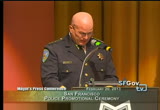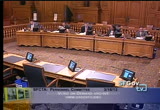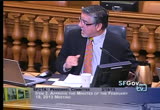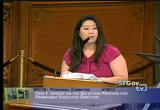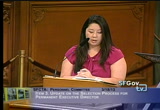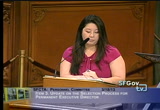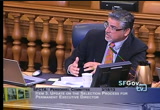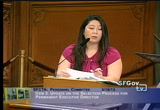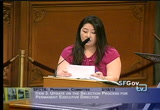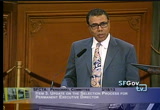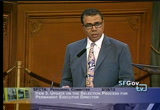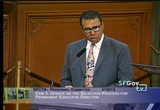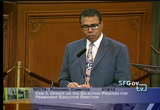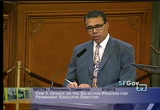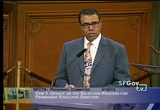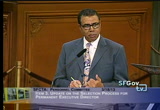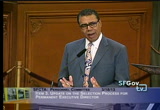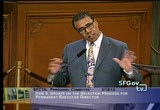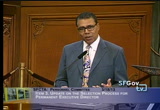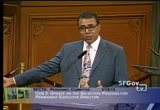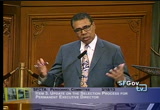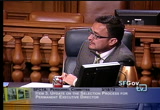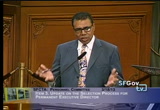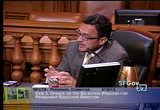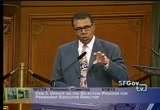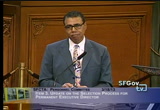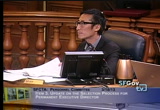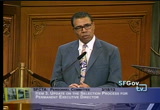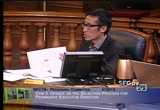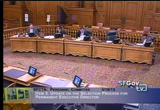tv [untitled] March 24, 2013 9:00pm-9:30pm PDT
9:00 pm
9:01 pm
and swroined by commissioner cohen and marr and wiener. this is the personnel committee. the clerk of the board is erika cheng and we are broadcast today by sfgtv. madam clerk will you share any announcements? >> we don't have any announcements. >> i did roll call already so we can go to item two. >> item two is approval of the minutes of february 19 meeting this. is action item. >> any comments? we will go on to public comment first. any member of the public that would like to comment? seeing none we will close public comment and a motion from eric marr to approve and seconded by commissioner campos and we will take that colleagues without objection. madam clerk our next item. >> pup date on selection
9:02 pm
process for the executive director. this is an information item. >> this is update for the permanent executive director. again this is an information item and we are looking for your guidance on the process. on february 26 at the last board meeting you approve the the process for the selection of the permanent executive director which directed staff to award an informal request for proposal. the approved -- i also have the approved schedule as part of attachment one for your reference and it details out the meetings and the milestones for the next three months. on february 20 we issued an irfp and we also established 100% dbe for the project. by march 6 we
9:03 pm
received seven proposals. three included the qualifications. the authority's staff served as the panel. we looked at requirements for the understanding of the roles and responsibilities of the ta and the executive director. experience with executive level recruitments such as executive director with agencies similar to the authority. we looked at the firms dealing with elected officials. we looked at the management and technical approach for each of the seven firms and we looked at the cost and the dbe, and those other participations. based on this process the selection panel award the the contract to the the hawkins company. the hawkins companies understood the challenges of this position and
9:04 pm
they have done related searches for leaders as organizations such as the san francisco bay area rapid transit, the dallas area rapid transit, l.a. mta and metropolitan authority and as well as other government agencies like the port of soak land and the city and county of san francisco. on march 11 we a awarded a contract in the amount of $51,250. this is well within the $60,000 budget and the procurement policy for issuing a contract under the interim executive director's threshold. i have here today the hawkins team. i would like to introduce william hauck hawk, steve nee lablont and the comanagers of the team their assistant. i
9:05 pm
would like to welcome them to the podium to go through the packet and also on attachment two. >> just a couple of questions before you bring them up. i am impressed with this group because they have done serves for about 200 transportation agencies and significant and in line what we're trying to find. if you can talk about the other ones that applied, i think three out of the seven and talk about the difference in terms what the hawkins group presented compared to the others just to give us context for the decision? based on what you said and the experience seems like a really great decision, but just have some context. >> sure. not a problem. like i said we received seven firms. would you like to know the names
9:06 pm
of the firms. >> yes. >> we received other than the hawkins company, gilbert treed associates, cough man associates, anchor resolution, sequence staffing, bob murray and associates. they are not only located in the bay area but throughout the united states. these are large firms with multiple offices within the united states and also firms that just have one location within california. our scoring ranged from 47 to up to 90. we locked at the criterias of proposal information and understanding of the project objectives. that was out of 20 points. most of the firm his a good understanding what we're looking for and what the position entailed and the complications that may come with the position located at city and county of san francisco. we lookedded at the technical
9:07 pm
approach. most of the firms did outline detail week by week schedule of what they plan to accomplish over the course of the next three months. we looked at experience and capabilities. that pretty much range friday companies that just. >> >> recruited for midlevel positions such as transportation planners and engineers all the way up to executive director. with the hawkins company they cited the experience they have with executive director positions and that's one of the main reasons we chose them. they received the highest amount of points in that section. in terms of cost they were pretty much in the middle of the range. we had costs from $18,000 all the way up to $55,000 is what i remember. in terms of this participation we had four firms
9:08 pm
that came in with zero participation. one with 3.5 and other firms that received 10 points. in total we took the average of all three panel scores. the firm with the highest average points is the one we awarded the contract to which is the hawkins company. >> great thank you. if we could mr. hawkins it would be great to see. >> my name is bill hawkins. i am president of the hawkins company headquartered in los angeles and offices in saramone. i would like to thank the staff. they have been instrumental and helpful to us. good afternoon commissioners. we are indeed grateful and honored to work with you on this important
9:09 pm
executive recruitment. we see our relationship as joined at hip throughout this process. we will make ourselves available to you at your beck and call. we will be available 24 similar seven. we will try to develop a relationship with you collective so so we have a understanding of what you are and what you're looking for and what the key attributes for the person to be successful. we have that as a cornerstone for this recruiting. we are pleased to do the search. several of the firms in the process are also outstanding firms and have an extensive track record so to be selected makes us honored and p privilegeed. we have worked with the city and county of san francisco in the past and we are pleaded of our stellar placement in the city and county of san francisco which is the
9:10 pm
librarian and named librarian of the year so we are familiar with this area. we have done a lot of work in the day area. the lasted 28 years of our existence we have probably done half of the recruitments in northern california so we are familiar with the economy, some of the issues relative to re-location, some of the issues in terms of attracting the best kind of talent to work for san francisco cta. just briefly the first phase of our recruitment starts -- i guess it started last week when we met with staff to get a framework for the aggressive timeline that you set before us in terms of the outreach and selection and evaluation of candidates to talk about logistics, to talk about the steps in the search process, but in all honesty the search is divided into three phases. the first phase is what we call the
9:11 pm
getting to know you, and that is when we get a good understanding of the organization. we want to find out what the key core competencies are. we want to talk to as many stakeholder as you deem necessary so we're awaiting your instructions and directions relative to the stakeholders beyond the board of supervisors and beyond this commission to identify the people that you want us to talk to and we will do that either face-to-face where appropriate, some telephonicically but we will definitely spend consider time with the stakeholders. we will probing in three areas with the stakeholders. one is to know their vision is for the county transportation authority. what they see as at key challenges and opportunities facing the next executive director? and then third we want to know what they see as a
9:12 pm
key competencies and skills and attributes needed for the leader of this organization? that will help us build a profile of what the ideal candidate is going to look like so we will the next week and a half doing this and we will produce a recruitment profile at the next meeting. i believe it's april 1. that profile will outline information about the city, information about the commission, information about the authority, the key attributes and the responsibilities for the position, but also will layout what the timeline is going to be and what the application process will entail. the next phase of the recruitment is really the marketing phase. we're taking a unique approach in this phase
9:13 pm
because our recruitment time has been compressed. norly a recruitment of this natures out reach phase is six to eight weeks. i believe ours is a little over four weeks which means we have to double our resources and i am honored and pleased to have my partners with me today, daphne lablonk any one of the top recruiters in the united states and has contacts in the industry and did work for organizations. most recently she has been the leader in basically staffing the entire leadership team at the dallas area rapid transit district in dallas texas so she will be the point person with the transit relateds activities with this recruitment. we have brent buyers who is from southern california but she
9:14 pm
attended berkeley and she's a go bears person and we won't hold that against her. they will look at people from municipal organizations from cities or counties and their skills might fit nicely in terms of this particular recruitment and she will be a point person related to all of the administrative activities and the evaluations will be funneled through her so she will play a key role in that regard and they can answer any specific questions you have. our recruitment effort we look at that as the marketing phase and we're researching people based upon what we identified in our conversations with you are the core competencies for the position. we turn those things you want this individual to achieve over the next 12, 18,
9:15 pm
24 months, and then we start looking for people that have duplicated or done similar activities in their own careers and look at patterns of success, and once we identify those patterns of success we individually contact those people if we can engage them in a discussion about the direction that our authority is going in and what are some of the things they think are are going to make sense for the next executive director. that conversation will lead them to becoming a candidate, lead to define the position, or a thought leader for us and there will make recommendations and in some cases make telephone calls on our behalf for colleagues to look at this position. we rely on little on the -- >> >> what we do in terms of
9:16 pm
calling people up, engaging in conversations and taking those conversations to the stage where they become interested in the position. we then evaluate them based on the core competencies that we have identified in this phase. the next part is we doing the interviews and narrowing the field down to presentation for the entire board of supervisors for the appointment. the reference checking and all of the compensation and things of that view. that gives a look at the search process. very broad but we're available to answer any questions you might have right now. >> thank you very much. thank
9:17 pm
you for being here mr. hawkins. i appreciate your time and effort to come up. actually you mentioned the aggressive timeline, and could you share with me your experience of working within timelines like this. what are the risks that you see in that and what do you think we're losing perhaps by such a tight timeline? >> well, what we typically find is if we have all of the key milestones identified on the front end, so for example we know on the day that you're going to interview candidates right now, so that helps us with an expedited time line and we are saying that the final candidates are going to be interviewed on may 21 so they know that in april so they can plan, so having a tight timeline works to our advantage. what works against us is sometimes
9:18 pm
we're trying to cast such a broad net because there are many types of individuals whose backgrounds and experiences could make them well suited and the broader that net is the longer to do that. if we identified 15 people from around the country that are the top people for this job then we can narrow in on those individuals and allow us to complete a process with a compressed timeline so a lot of that has to do whether we recommend increasing the timeline based on meeting with you and how broad the net needs to be cast. it person can come from an organization like this or from a consulting firm, from a municipal organization. if you open it up really wide then it takes longer to make sure that
9:19 pm
we've effectively made all those contacts so to the degree that we can narrow it down in terms of the focus is that works in our favor of the accelerated timeline. >> thank you very much. one last question and probably the willingness to figure out a narrow scope for that search. also do you have other processes or searches that you are doing that could help with this search as well? do you anything parallel to this that might have cross over to help with this effort? >> not directly but we domain tain a very expensive data base so we have individuals that we have started to contact even before we were awarded the contract we made telephone calls to individuals to find out what this scope is looking like? what is the field looking like? even in the scoping phase getting an understanding of the organization and we are
9:20 pm
periodically talking to people and really part of phase two we're still doing it in phase one so even though there is a one, two, three step process they're overlapping. as we were driving around the city today dealing with the congestion of san francisco we were thanking and talking about people we know in other parts of country to reach out to and from that standpoint we already have a foot on the ground. >> thank you. commissioner campos. >> thank you mr. chair and thank you again for your presentation. thank you to staff for the good work. just a couple of questions. i am wondering if you could give us a little information on sort of how do you decide how much input you get from the stakeholders, from the community? and related to that from other members of the board? i am just wondering
9:21 pm
sort of how do you know that you've had enough input or feedback if you will? >> enough is never enough, and so we try to be as inclusive as possible in the stakeholder engagement process. we have some key drivers that we're looking for and we're also looking for things that are going to be common in all of our discussions. where we find instances we're getting real mixed signals about the type of person, or the types of challenges, then we want to bring that back in this particular case the chair's attention so that he knows and can direct us. we may have to reconvene to say we're hearing listen to the personnel committee we're hearing x but listening to the other stakeholders we're hearing y and we need to sort through that and share that information with
9:22 pm
you. historically usually it pretty much lines up pretty consistently but we do have apparatus in place should that happen and it triggers a contact with the chair and a request for maybe a convening a special meeting of the personnel committee to hash through that and come to a meeting of the minds as to the direction you want us to take because we always want to be in step with the direction of this committee. >> just a last point i would make is mostly just a comment. you know one of the things that i think is unique about this search is that the county transportation authority is a very unique agency in that many respects it oversees the implementation of transportation and sales tax, so it's a very
9:23 pm
san francisco specific agency in that sense, and i think it's important to do a pretty comprehensive search, but i want to make sure that there's also a focus on the san francisco specific needs that we have including making sure that local internal candidates are part of the consideration because i do think that we're unique in many respects. >> i agree with that wholeheartedly. our outreach strategy is two fold. we always start with a focused area for a variety of reasons including economics. given the current economic conditions in the country lot of of relocation and family relationships and the others we try to start in this area and then build out from there, so although it's a national recruitment our first focus is local, then regional,
9:24 pm
then nationally. where that differs -- where we defer from that is when we don't have strong individuals in certain parts of the country. we went south carolina because we heard about somebody or to boston and someone that knows this area well and from that point we're focused on it but the efforts from concentrated in the bay area, california, western region, the nation so that is kinds of the process. >> i appreciate that and i won't hold that against you that you don't have a stanford grad on your team. >> we're looking for one. >>i thought you were going to say harvard. that's not
9:25 pm
california though. >> commissioner mar. >> thank you and i look to be joined at the the hip with you as well as we run through the process. i want to ask a question. i think commissioner campos was getting at there is expectation in san francisco there is transparency and as you develop the competency scpis wanted to ask about protecting the privacy of interested applicants and how you advise us to play that part and protecting the privacy of anyone interested in the position. hopefully that we get a lot of people but how can we ensure that privacy will be protected? >> good question. there are two things that we try to do with candidates. number one, we
9:26 pm
ensure confidentiality will be maintained up until the time they come to san francisco for a face-to-face interview. once they come into this building or whatever building we're going to use then all bets are off and we don't know who they're going to run into, who is going to hear about it. we protect the confidentiality up to that point. we advise candidates when they need to release that information to their current employers so we give them coaching around that, when it's necessary, how to do it, how to keep the lid on. the preliminary references that we do is always done with individual who is will not jeopardize an individual's current employer so we're not talking to people like that. final references done with those individuals. we abide by the open records laws, and the sunshine laws and i think in san francisco we haven't talked to the city attorney about that or
9:27 pm
your counsel about that but the open records laws and sean -- sunshine laws protect them up to appointment so we're not in a situation where every transmission of information is available to the general public. if that is the case or that becomes the case then we change the strategy around a little bit so we can help to protect the identity of the candidates, not necessarily the backgrounds, but the identity of the candidates by still abiding by those laws. >>i think one of the strengths of your team is the tremendous community involvement and searches that you done. i find it interesting to the work you did in l.a. and many nonprofits. my hope is as
9:28 pm
our diverse communities expect topnotch transportation selection processes like this that we can involve them in as many of the aspects of the profile and the competencies that we can and i welcome a number of stakeholder groups and give you the recommendations as we sit down to one-on-one conversations. >> thank you. >> thank you. commissioner wiener. >> thank you mr. chairman. i am looking forward to working together. it's an incredibly important search for san francisco and our future and i look forward to that process, and i also apologize that i have to head to another hearing after i make this comments. i am hoping that we can resolve it so it's not a standing conflict in the future, so i am glad to hear that you start locally and
9:29 pm
expand nationally. i don't know who is applying but i think we have strong internal talent at the ta but it's good to cast a broad net and i want to make sure if there is that exceptional candidate in south carolina or somewhere else we're not missing the opportunity to at least speak with that person. i also want to stress that this -- i think that the heads of all transportation agencies -- it's always interconnected with many agencies working together but in san francisco and the bay area and particularly this agency i think it's more so and one of the challenges in san francisco around transportation i can't remember whether it's 28 -- we have too many transit agencies in the bay area and it causes a lot of challenges around -- we are a regio
60 Views
IN COLLECTIONS
SFGTV: San Francisco Government Television Television Archive
Television Archive  Television Archive News Search Service
Television Archive News Search Service 
Uploaded by TV Archive on

 Live Music Archive
Live Music Archive Librivox Free Audio
Librivox Free Audio Metropolitan Museum
Metropolitan Museum Cleveland Museum of Art
Cleveland Museum of Art Internet Arcade
Internet Arcade Console Living Room
Console Living Room Books to Borrow
Books to Borrow Open Library
Open Library TV News
TV News Understanding 9/11
Understanding 9/11